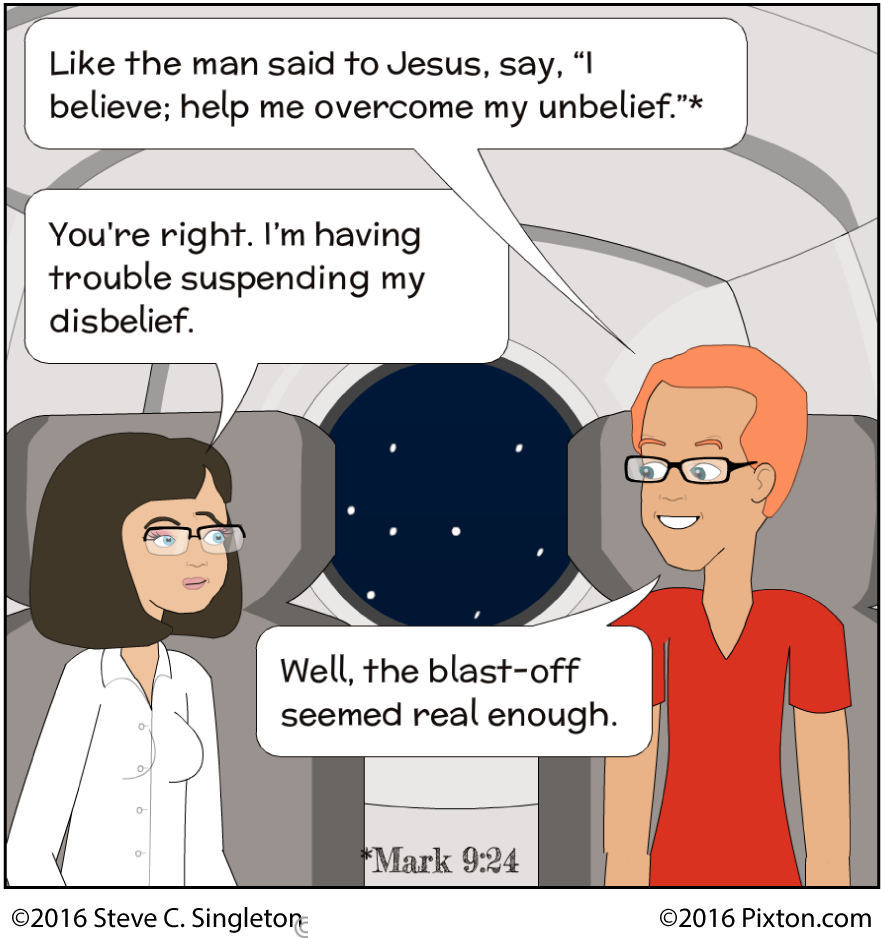The journey of faith
Faith vs. gullibility
The rift between the Christian and the secular person seems to widen daily. Infused with the spirit of rationalism and the scientific method, we all tend to be skeptical of what has no length, height, volume, weight, or temperature. Growing doubts concerning the claims of Christianity constitute a formidable barrier to spiritual seekers.
What Christian believers call faith their secular friends tend to dismiss as gullibility. “I would love to believe,” they say, “but I find it irrational. How do you know that it all isn’t just made up?” Christians, however, acknowledge that some things that are real are necessarily intangible.
The Apostle Paul expresses this rift as a matter of perception: “The natural man does not accept the things that come from God’s Spirit, for they are foolishness to him, and he cannot understand them, because they are spiritually discerned. The spiritual man makes judgments about all things….” (1 Corinthians 2:14-15). In other words, to deny the realities of the spiritual half of the universe is to cut oneself off from realities that are real, though non-empirical, realities like good and evil, freedom and tyranny, guilt and innocence, Satan and Jesus Christ.
The forming of faith
The Bible says that “faith comes by hearing, and hearing by the word of Christ.” In other words, when people hear the message of the gospel, that’s what causes faith to germinate, incubate, and regenerate. Faith develops on the basis of credible testimony. It grows when experienced in the roller coaster of life. The prophet Habakkuk says, “The righteous will live by faith” (Habakkuk 2:4, quoted in Romans 1:17 to support the concept that the gospel saves the person whose faith persists from the beginning to the very end, what Paul calls “faith, first to last.”
Faith in Christ, not Christianity
Faith is not essentially in a set of doctrinal statements or formulations. It is trust, commitment, loyalty, to a Person, Jesus Christ. And this Person has proven Himself to be consistently trustworthy. He has earned our trust by a thousand acts of selfless service, and what He demands of us is always a help to us and never a burden (Matthew 11:28-30; 1 John 5:3). His ultimate purpose is not to impoverish us, but to enrich us. He wants, in fact, to invest Himself in us. We are the center of His attention.
Challenges to faith
Attempts to undercut confidence in the claims of Scripture are claims unsubstantiated by the facts. For example, there is no time for the reputation of Jesus to outgrow the historical facts, as some claim, for the eyewitnesses to his life, death, and resurrection outlived the cross by up to forty years, during which period virtually the entire New Testament was written.
The claim that He is alive from the dead (Acts 2:22-40) was immediate and made at the very place where it could have been invalidated. The proclamation that He is the one and only Savior of humankind (Acts 4:12) occurred within months of the cross. The preaching recorded in Acts (the apostolic kerygma) dovetails with the Christological claims of Paul’s epistles, written from about 20 to about 37 years after the cross (see, for example, 1 Thessalonians 4:14-17; 2 Thessalonians 1:5-10; 1 Corinthians 1:30; 2 Corinthians 5:14-20; Romans 5:18-19; Ephesians 1:7; Ephesians 2:13-18; Philippians 2:5-11; Colossians 1:15-20; Colossians 2:2, 9).
It is true that the primitive church made much of Jesus, but it did not make claims for Him which He did not make for Himself. He claimed the authority to forgive sins, and God confirmed that claim by empowering Him to heal (Mark 2:5-12). He claimed that His life would be sacrificed as a ransom for many and that His blood would confirm the new covenant and provide forgiveness of sins (Mark 10:45; Matthew 26:28). He claimed that His voice will raise the dead at the last day (John 5:28-29) and that He will be the judge at the resurrection (Matthew 7:21-25; Matthew 25:31-46). He claims to be the only true and living way to the Father (John 14:6) and the true likeness of His nature (John 14:9-11). He claims that eternal life is knowing God and Himself, the one God has sent (John 17:3).
In response to all of these faithful attitudes and actions, Christ calls on us to make a faith-response, which involves repentance from our sins, confessing our faith and allegiance to Christ, and becoming connected to Him through a re-enactment of His death, burial, and resurrection in water baptism (1 Thessalonians 1:8-10; Romans 10:9-10; Colossians 2:9-15; Romans 6:3-23; Galatians 3:26-29). In none of this response, however, is the focus on what we do, but on what He has done, for Jesus is the only Savior. Nothing we do can save us; we must trust God’s mercy and the power of Christ’s sacrificial death and life-giving resurrection (Titus 3:5-7).
Faith’s destination
The goal of faith is not to arrive at complete knowledge of Christ, but to become like Christ in every possible way: to be transformed in to His image, to share His righteousness, to think with His mind, and to serve with His heart, to imitate Him, and to walk as He walked (see Romans 8:29-30; 2 Corinthians 5:21; 1 Corinthians 2:16; Galatians 5:13; 1 Corinthians 11:1; 1 John 2:6; 1 Peter 2:21-24). Christ empowers us to reach that destination by pouring out the Holy Spirit into our hearts (Romans 5:5).
Want to go deeper?
- Leon Morris – The Apostolic Preaching of the Cross (Grand Rapids, Mich.: Eerdmans, first published in 1955 and continually in print ever since).
Explains in great detail what the New Testament teaching about the meaning of Christ’s sacrifice on the cross, with separate chapters of redemption, Lamb of God, reconciliation, justification, propitiation, etc.
- Steve C. Singleton – “Learning to Believe”
Poem about the journey of faith.
- Steve C. Singleton – “Who is really committed to reason?”
About the growing antagonism between believers and unbelievers.
Now it’s your turn…
What would you like to share with the rest of us about your “journey of faith”?
- Are you far along the path? If so, what have you learned about Jesus that you would like to share with us?
- Have you just started out? Perhaps you have questions or what to reveal something surprising you have discovered about trusting Christ.
- Are you standing at the path’s entrance? Perhaps you too have questions or comments about whether trusting in Christ seems rational or a crazy act of a gullible soul.
Leave your comments, and join in the discussion that will follow.






